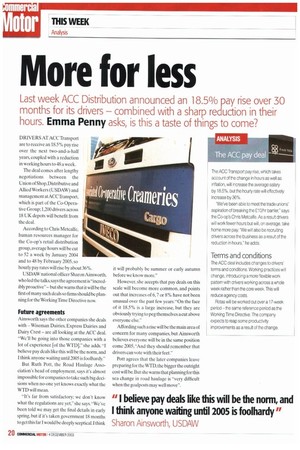More for less
Page 20

If you've noticed an error in this article please click here to report it so we can fix it.
Last week ACC Distribution announced an 18.5% pay rise over 30 months for its drivers — combined with a sharp reduction in their
hours. Emma Penny asks, is this a taste of things to come?
DRIVERS AT ACC Transport are to receive an 18.5% pay rise over the next two-and-a-half years, coupled with a reduction in working hours to 48 a week.
The deal comes after lengthy negotiations between the Union of Shop. Distributive and Allied Workers (USDAW) and management at ACCTransport, which is part of the Co-Operative Group; 1,200 drivers across 18 UK depots will benefit from the deal.
According to Chris Metcalfe, human resources manager for the Co-op's retail distribution group, average hours will be cut to 52 a week by January 2004 and to 48 by February 2005. so hourly pay rates will rise by about 36%.
USDAW national officer Sharon Ainsworth. wholed the talks.says the agreement is "incredibly proactive"but she warns that it will be the first of many such deals so firms should be planning for the WorkingTime Directive now.
Future agreements
Ainsworth says the other companies she deals with -Wiseman Dairies. Express Dairies and Dairy Crest are all looking at the ACC deal. "We'll be going into those companies with a lot of experience [of the WTD]." she adds. "I believe pay deals like this will be the norm, and I think anyone waiting until 2005 is foolhardy" But Ruth Pott, the Road Haulage Association's head of employment, says it's almost impossible for companies to take such big decisions when no-one yet knows exactly what the WTD will mean.
"It's far from satisfactory; we don't know what the regulations are yet." she says. "We've been told we may get the final details in early spring. but if it's taken government 18 months to get this far !would be deeply sceptical. I think it will probably be summer or early autumn before we know more."
However, she accepts that pay deals on this scale will become more common, and points out that increases of 6,7 or 8% have not been unusual over the past few years: "On the face of it 18.5% is a large increase, but they are obviously trying to peg themselves a cut above everyone else.
Affording such a rise will be the main area of concern for many companies, but Ainsworth believes everyone will be in the same position come 2005, "And they should remember that drivers can vote with their feet."
Pott agrees that the later companies leave preparing for the WTD, the bigger the outright cost will be.But she warns that planning for this sea change in road haulage is "very difficult when the goalposts may well move". The ACC Transport pay rise, which takes account of the change in hours as well as inflation, will increase the average salary
by 18.5%, but the hourly rate will effectively increase by 36%.
"We've been able to meet the trade unions' aspiration of breaking the £113/hr barrier," says the Co-op's Chris Metcalfe, As a result drivers will work fewer hours but will, on average, take home more pay "We will also be recruiting drivers across the business as a result of the reduction in hours," he adds.
Terms and conditions
The ACC deal includes changes to drivers' terms and conditions. Working practices will change, introducing a more flexible work pattern with drivers working across a whole week rather than the core week. This will reduce agency costs.
Rotaswill be worked out over a 17-week period the same reference period as the Working Time Directive. The company expects to reap some productivity improvements as a result of the change.
































































































































































































